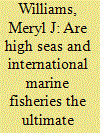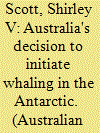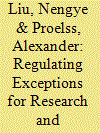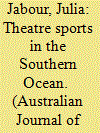| Srl | Item |
| 1 |
ID:
067232


|
|
|
| 2 |
ID:
127343


|
|
|
|
|
| Publication |
2014.
|
| Summary/Abstract |
On May 31, 2010, Australia instituted proceedings before the International Court of Justice in the case of Whaling in the Antarctic (Australia v. Japan). Although Australian politicians had for some time threatened such a course of action, the decision to proceed with international litigation took many observers by surprise, most basically because Japan appeared to be in a strong legal position and the risks associated with the case appeared greater than Australia's prospects for success. This article examines the background to the whaling dispute and suggests two ways in which litigation in the World Court may contribute to resolution of the dispute no matter the legal outcome of the case.
|
|
|
|
|
|
|
|
|
|
|
|
|
|
|
|
| 3 |
ID:
185847


|
|
|
|
|
| Summary/Abstract |
The Antarctic Treaty System provides the corpus of law that governs the obligations of its Parties to protect and conserve the Antarctic environment. The System consists principally of the Antarctic Treaty (the Treaty), the Convention on the Conservation of Antarctic Marine Living Resources (CAMLR Convention), and the Protocol on Environmental Protection to the Antarctic Treaty (Environmental Protocol). The Antarctic Treaty establishes the Antarctic Treaty Consultative Meeting – the body that makes decisions under the provisions of the Treaty and Environmental Protocol. The CAMLR Convention establishes the Commission for the Conservation of Antarctic Marine Living Resources (CCAMLR) – its decision-making body. Together, these two international bodies are responsible for the modern-day conservation and environmental management regimes for Antarctica and the Southern Ocean. This paper looks at the scope of law developed under the Antarctic Treaty System and its evolution; and at the interaction between the different components of the Antarctic Treaty System. The paper also forecasts some of the future challenges to conservation and environmental protection in Antarctica and the Southern Ocean.
|
|
|
|
|
|
|
|
|
|
|
|
|
|
|
|
| 4 |
ID:
188226


|
|
|
|
|
| Summary/Abstract |
This article examines the concepts of “research fishing” and “directed fishing” under the Ross Sea region Marine Protected Area (RSrMPA) with specific regard to MPAs as a conservation tool, drawing comparisons with related concepts contained in two other agreements, namely, the 1946 International Convention for the Regulation of Whaling (ICRW) and the 2018 Agreement to Prevent Unregulated High Seas Fisheries in the Central Arctic Ocean (CAOF Agreement). It first reviews the negotiation processes of the RSrMPA, focusing on debates between so called “fishing states” and “conservation states,” as well as the political compromise that led to the establishment of the RSrMPA. Second, it takes a detailed look at the regulation of “research fishing” and “directed fishing,” which may be conducted in the RSrMPA and the three zones into which it is divided. Third, it analyzes how “scientific research activities” and “exploratory fishing” are regulated in the CAOF Agreement. Thereafter, this article examines the role of the concept of whaling “for purposes of scientific research” under the ICRW. It concludes with an assessment of differences and similarities between the analyzed regulatory instruments, which identifies recommended lessons for the design of Conservation and Management Measures establishing MPAs that both reflect the precautionary approach and strike a balance between conservation and utilization.
|
|
|
|
|
|
|
|
|
|
|
|
|
|
|
|
| 5 |
ID:
088906


|
|
|
|
|
| Publication |
2009.
|
| Summary/Abstract |
In the great whaling debate, fuelled twice yearly by the annual International Whaling Commission meeting and the departure of the Japanese research fleet for the Southern Ocean, silliness knows no bounds. 2008 was no exception, as the Southern Ocean again became the location of protest action (sometimes provocative and potentially life-threatening) against Japanese scientific research vessels. The Japanese are accused of 'whaling' in a whale sanctuary off the Australian Antarctic Territory, yet this claim to sovereignty is not legally proven and therefore not universally accepted. The Rudd Labor Government bowed to significant pressure and sent its Customs vessel, the Oceanic Viking, to spy on the Japanese fleet and gather evidence for a possible 'world court' action. This paper examines what options were available to Australia to intervene in the protest action, to monitor the Japanese research and to take legal action in an international forum within the constraints of internationally defined diplomatic and legal boundaries. It concludes that the risk of attracting the wrath of the Japanese government and other Antarctic Treaty countries is great indeed and the Australian government must be careful not to step too far outside these boundaries.
|
|
|
|
|
|
|
|
|
|
|
|
|
|
|
|